Finding Support and Community When Living With ALS
How advocacy groups like I AM ALS and others in the community lift us up
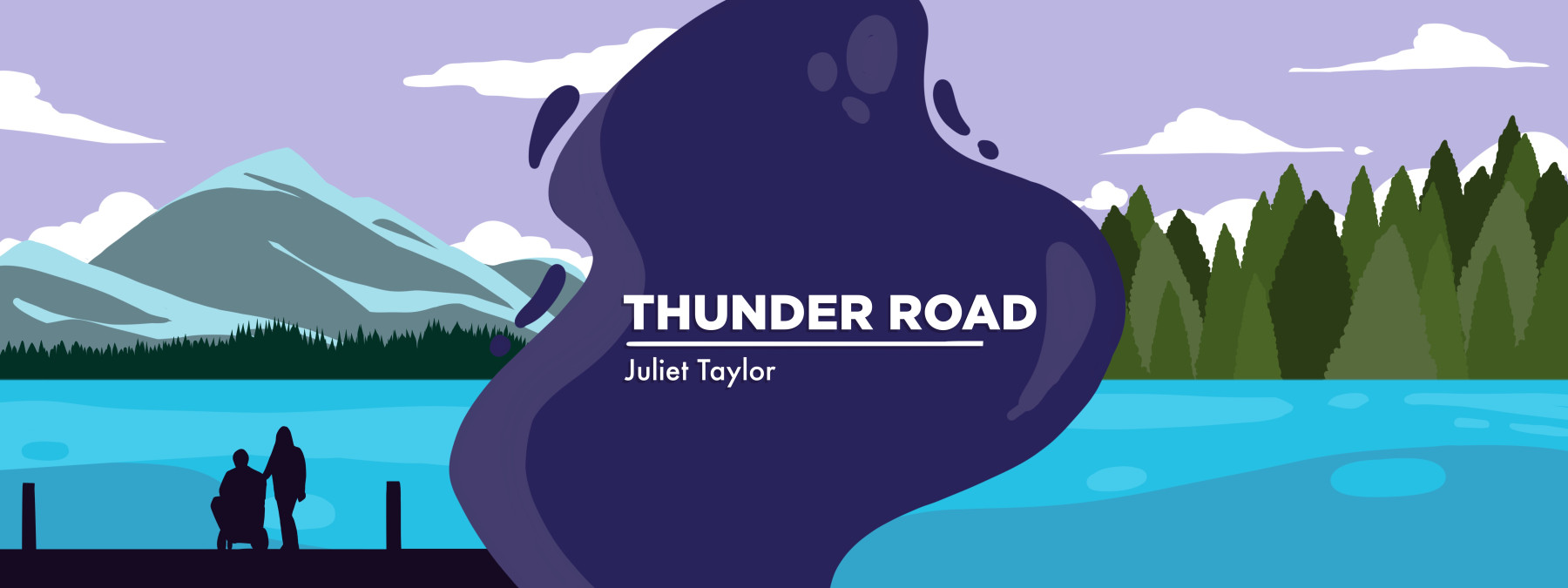
When my late husband, Jeff, was diagnosed with ALS in October 2018, I remember the early, seemingly insurmountable feelings of fear and bewilderment. I remember understanding that we were out of our depth in a completely foreign world of symptoms, appointments, and terminology, layered with the unbelievable knowledge that this illness would likely end in Jeff’s death.
There was no finding comfort in those early days. Glued to the internet, I clung to anecdotal stories of slow ALS progression and 20-year survival rates, which I’d share with Jeff, seeking to reassure both of us. The shock of his diagnosis a few weeks prior had given way to bargaining and resolve: Somehow, we would beat this thing.
But, as with his diagnosis, it seemed like we’d have to do it alone. We didn’t know anyone with ALS; in fact, we barely knew what it was.
The week Jeff was diagnosed, I instinctively called our local chapter of the ALS Association. In retrospect, I realize that my only agenda item was to seek comfort from a total stranger. And remarkably, I found it.
The woman who answered the phone spoke with me, on zero notice, for an entire hour. Elizabeth was a social worker, and as I paced around the yard while we talked, she acknowledged the feelings of fear, loss, and confusion that often come with an ALS diagnosis. Her words made me feel less alone and more encouraged, like perhaps there was a way forward through what we were feeling.
I didn’t know it at the time, but my talk with Elizabeth was my first of hundreds of experiences with a glorious community of incredible humans united in three things: their disdain for ALS, their relentless advocacy for treatments and cures, and their desire to make life better for others living with the disease.
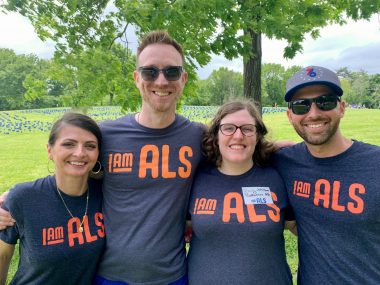
Team members and volunteers from the advocacy group I AM ALS gather in Washington, D.C., in May, to push for funding and research for a cure for ALS. (Photo by Juliet Taylor)
Elizabeth was also the first among those I came to consider our “angels” — people Jeff and I gratefully seemed meant to encounter while living with ALS. I’ve continued meeting them since he died. I recognize them as everyday people who inspire with selflessness, teach us how to fight ALS, and deepen connections among people who never wanted this disease yet somehow live to help others along the way.
Other angels appeared right after Elizabeth: Heidi, a friend of a friend who had lost her mom to the illness; then a neighbor who’d lost her husband; and then another who’d lost her uncle. Heidi and I met in person only once, but her regular calls and texts gave us confidence, encouragement, and love, uncannily when we needed it the very most. This, I now know, is the nature of ALS friendships and the ALS community.
The spring after Jeff’s diagnosis, I reached out to a newly created organization called I AM ALS and joined its community outreach team. This felt like a way to help, to volunteer my communication skills while meeting other people and families who were facing ALS, too. For the first six months, I was mostly silent, somewhat self-consciously wondering what I brought to the table as I simply listened.
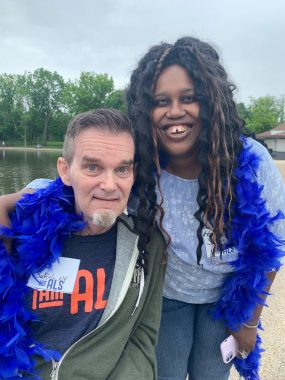
Tim Lowrey and Katrina Byrd, ALS advocates, gather in Washington, D.C., in May. (Photo by Juliet Taylor)
As I learned about how I AM ALS was changing the ALS landscape, my perception of leadership and heroism shifted. Brian Wallach, Sandy Morris, Bryan Wayne Galentine — they and other new friends were testifying before Congress, convincing Major League Baseball to host a Lou Gehrig Day, and taking over Times Square to improve ALS outcomes. I started to raise my hand a bit more, beginning to see the value in giving back as my own knowledge grew.
During this time, Jeff and I were also living with the cruelty of his ALS and his faster-than-average progression. Living with ALS and caregiving often left little time for outside connection, a reality many with ALS live with, but the group was always there.
I AM ALS brings community and belonging for those living with ALS, but there are other organizations, too. I’ve found ALS groups and communities to be universally welcoming, easy to access virtually, and adept at uniting people, whether newly diagnosed or living with the disease for longer.
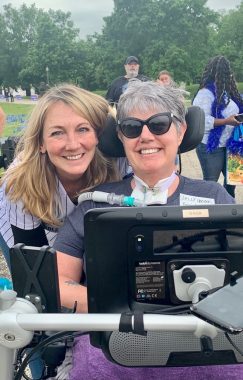
Juliet Taylor, left, and Shelly Hoover join with other ALS community members in Washington, D.C., in May. (Courtesy of Juliet Taylor)
For Jeff and me, the support and belonging of an ALS community helped us to find connection, learn how to live better with ALS, and feel hope for a future of progress toward treatments and cures.
Today I’m the co-chair of that same group that I so quietly joined more than three years ago. I’ve recognized that perhaps I can be a voice on the phone for someone else, paying forward the help I was given. What I didn’t realize then, and what I gratefully value now, is how much a part of my own life’s purpose that turned out to be.
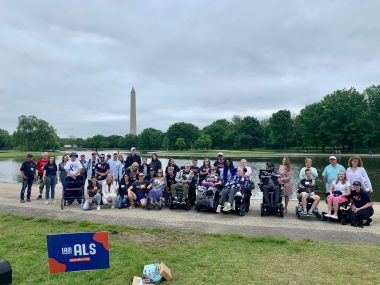
Members of the ALS community gather in Washington, D.C., in May. (Photo by Juliet Taylor)
Note: ALS News Today is strictly a news and information website about the disease. It does not provide medical advice, diagnosis, or treatment. This content is not intended to be a substitute for professional medical advice, diagnosis, or treatment. Always seek the advice of your physician or other qualified health provider with any questions you may have regarding a medical condition. Never disregard professional medical advice or delay in seeking it because of something you have read on this website. The opinions expressed in this column are not those of ALS News Today or its parent company, Bionews, and are intended to spark discussion about issues pertaining to ALS.








Len Jax
Hi Juliet,
Thank you for being that kind voice on the phone and paying it forward to others. You continue to wear your ALS shoes and walk with all of us on our journey. I find it amazing that we find our life's purpose/passion in the most unexpected places! Thank you for finding yours. It helps all of us.
Len
Rick P
Thank you for continuing on with the fight.